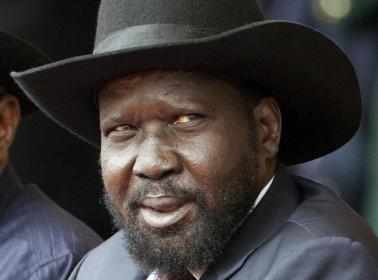South Sudan president agrees to adoption of federal system: source
October 26, 2014 (JUBA) – South Sudan’s president, Salva Kiir, has unconditionally accepted the adoption of a federal system of governance in the country, including all accompanying reforms, a high-level presidential source disclosed on Sunday.

“The breakthrough which the IGAD chief mediator announced on Wednesday after the close of the mini summit is the acceptance of Riek Machar to recognise president Salva Kiir as the democratically elected and the constitutionally mandated president of the Republic of South Sudan and that he would not continue to advocate for his removal by force,” the source told Sudan Tribune.
“In this context, the president accepted without condition to share power with [the] rebels. He will accept whoever they will nominate to the post of prime ministers,” he added.
Significantly, this would waive Kiir’s right to veto nominees to the post of prime minister.
The issue of federalism has long caused unnecessary division within the country and among citizens, the presidential aide said.
Ongoing debate surrounding federalism was the trigger for repeated conflict with successive governments in Sudan, from which the South seceded in 2011 after the signing of the 2005 comprehensive peace agreement (CPA) ended more than two decades of civil war and paved the way for a referendum on self determination.
“The president never opposed federalism. What he has been saying is that any system of governance should be decided by the people of South Sudan through an all-inclusive process, like the current constitutional-making process, because this is a very important matter to be decided by individuals or institutions,” the source said.
“But because it seems that he has been misunderstood, including our friends and political allies from the region, he accepted to remove any obstacle to the peace process, including the issue of federalism,” he added.
Leading opposition figures said they were informed of Kiir’s decision by Kenyan president Uhuru Kenyatta and the Ethiopian and Uganda prime ministers, who attended the one-day mini summit in the capital, Juba, on 22 October.
“Our colleagues attending [a] leadership briefing in Nairobi, Kenya, have told us that Salva Kiir has accepted that he will not have any veto power on our nominee to the post of prime minister,” rebel spokesperson Abdullah Kuot said.
“From one side, and this is just my opinion, there is no other person than our chairman, comrade Dr Riek Machar,” he added.
Kuot, a former Northern Bahr el Ghazal MP who defected to the rebel faction, told Sudan Tribune on Sunday that the reforms would cover all sectors, including security, public service, finance, foreign relations and governance.
He said the opposition movement was also committed to combating corruption and nepotism and planned to focus efforts on restoring public confidence and trust in public institutions.
If confirmed, observers say the agreement would represent a major concession on the part of Kiir and would demonstrate his government’s commitment to resolving the conflict through peaceful dialogue.
An IGAD summit is expected to be convened next week in Ethiopia.
(ST)
